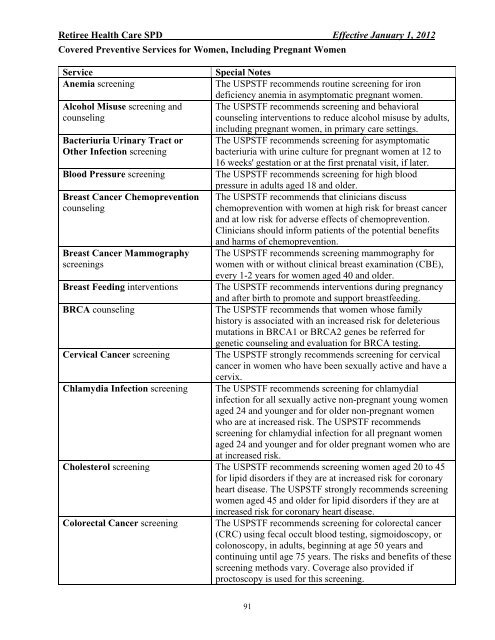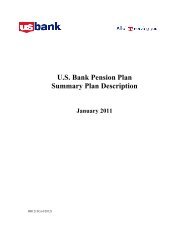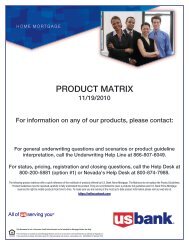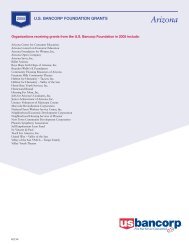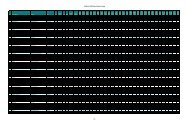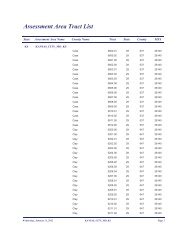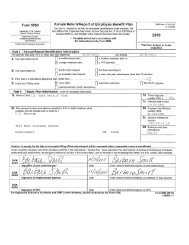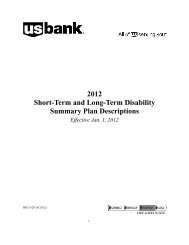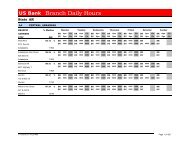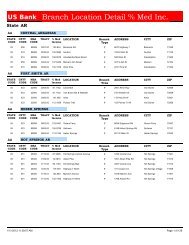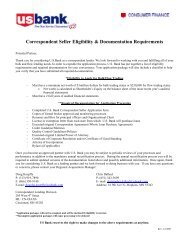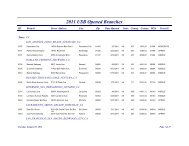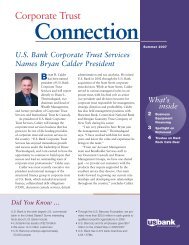The eligibility and enrollment rules for the U
The eligibility and enrollment rules for the U
The eligibility and enrollment rules for the U
You also want an ePaper? Increase the reach of your titles
YUMPU automatically turns print PDFs into web optimized ePapers that Google loves.
Retiree Health Care SPD Effective January 1, 2012<br />
Covered Preventive Services <strong>for</strong> Women, Including Pregnant Women<br />
Service Special Notes<br />
Anemia screening <strong>The</strong> USPSTF recommends routine screening <strong>for</strong> iron<br />
Alcohol Misuse screening <strong>and</strong><br />
counseling<br />
Bacteriuria Urinary Tract or<br />
O<strong>the</strong>r Infection screening<br />
deficiency anemia in asymptomatic pregnant women.<br />
<strong>The</strong> USPSTF recommends screening <strong>and</strong> behavioral<br />
counseling interventions to reduce alcohol misuse by adults,<br />
including pregnant women, in primary care settings.<br />
<strong>The</strong> USPSTF recommends screening <strong>for</strong> asymptomatic<br />
bacteriuria with urine culture <strong>for</strong> pregnant women at 12 to<br />
16 weeks' gestation or at <strong>the</strong> first prenatal visit, if later.<br />
Blood Pressure screening <strong>The</strong> USPSTF recommends screening <strong>for</strong> high blood<br />
pressure in adults aged 18 <strong>and</strong> older.<br />
Breast Cancer Chemoprevention <strong>The</strong> USPSTF recommends that clinicians discuss<br />
counseling<br />
chemoprevention with women at high risk <strong>for</strong> breast cancer<br />
<strong>and</strong> at low risk <strong>for</strong> adverse effects of chemoprevention.<br />
Clinicians should in<strong>for</strong>m patients of <strong>the</strong> potential benefits<br />
<strong>and</strong> harms of chemoprevention.<br />
Breast Cancer Mammography <strong>The</strong> USPSTF recommends screening mammography <strong>for</strong><br />
screenings<br />
women with or without clinical breast examination (CBE),<br />
every 1-2 years <strong>for</strong> women aged 40 <strong>and</strong> older.<br />
Breast Feeding interventions <strong>The</strong> USPSTF recommends interventions during pregnancy<br />
<strong>and</strong> after birth to promote <strong>and</strong> support breastfeeding.<br />
BRCA counseling <strong>The</strong> USPSTF recommends that women whose family<br />
history is associated with an increased risk <strong>for</strong> deleterious<br />
mutations in BRCA1 or BRCA2 genes be referred <strong>for</strong><br />
genetic counseling <strong>and</strong> evaluation <strong>for</strong> BRCA testing.<br />
Cervical Cancer screening <strong>The</strong> USPSTF strongly recommends screening <strong>for</strong> cervical<br />
cancer in women who have been sexually active <strong>and</strong> have a<br />
cervix.<br />
Chlamydia Infection screening <strong>The</strong> USPSTF recommends screening <strong>for</strong> chlamydial<br />
infection <strong>for</strong> all sexually active non-pregnant young women<br />
aged 24 <strong>and</strong> younger <strong>and</strong> <strong>for</strong> older non-pregnant women<br />
who are at increased risk. <strong>The</strong> USPSTF recommends<br />
screening <strong>for</strong> chlamydial infection <strong>for</strong> all pregnant women<br />
aged 24 <strong>and</strong> younger <strong>and</strong> <strong>for</strong> older pregnant women who are<br />
at increased risk.<br />
Cholesterol screening <strong>The</strong> USPSTF recommends screening women aged 20 to 45<br />
<strong>for</strong> lipid disorders if <strong>the</strong>y are at increased risk <strong>for</strong> coronary<br />
heart disease. <strong>The</strong> USPSTF strongly recommends screening<br />
women aged 45 <strong>and</strong> older <strong>for</strong> lipid disorders if <strong>the</strong>y are at<br />
increased risk <strong>for</strong> coronary heart disease.<br />
Colorectal Cancer screening <strong>The</strong> USPSTF recommends screening <strong>for</strong> colorectal cancer<br />
(CRC) using fecal occult blood testing, sigmoidoscopy, or<br />
colonoscopy, in adults, beginning at age 50 years <strong>and</strong><br />
continuing until age 75 years. <strong>The</strong> risks <strong>and</strong> benefits of <strong>the</strong>se<br />
screening methods vary. Coverage also provided if<br />
proctoscopy is used <strong>for</strong> this screening.<br />
91


